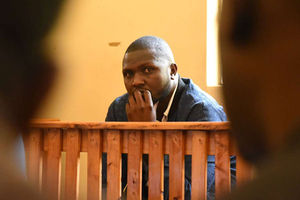
Mr Godfrey Kagongo. He was acquitted of the murder of Rift Valley National Polytechnic lecturer Irene Jepchumba Boit (inset left). Inset right is government pathologist Titus Ngulungu.
The acquittal of a man charged with the murder of Rift Valley Institute of Science and Technology (RVIST) lecturer has put three pathologists on the spot. This is after the autopsy report raised questions about their professional conduct.
Justice Joel Ngugi, in his judgement delivered by Justice Patricia Gichohi, has faulted the post-mortem report whose glaring errors led to its disqualification during the trial.
The report, which was signed by government pathologist Titus Ngulungu, had indicated that the murder victim, Irene Jepchumba Boit, died of trauma caused by manual strangulation.
The prosecution had sought to advance the theory that the man on trial — Godfrey Kipkemoi Kangogo — was the main perpetrator of the murder on July 6, 2018, at Chokaa Falls along Molo River in Rongai Sub-County.
During the trial, the prosecution told the court that Dr Ngulungu conducted the post-mortem alongside two other pathologists — with one allegedly hired by the family of the deceased and another by the defence team.
However, the court established that Dr Ngulungu is the only one who signed the autopsy report that was presented as an exhibit.
No joint report
Justice Ngugi further established that the two other pathologists present did not compile their own reports or sign Dr Ngulungu’s.
The pathologist hired by the defence faulted the conduct of the pathologists and accused them of doctoring the report.
“It would have been expected that each doctor would have reached their own independent opinion in their report or prepared a joint report that should have been signed by all. The doctors could not explain why they did not sign the joint report or prepare their own finding," said Justice Ngugi.
The judge raised questions regarding the conduct of Dr Ngulungu, who had received Sh15,000 from the deceased’s family to facilitate the post-mortem.
“There was a procedural issue especially when two doctors were paid by the deceased’s family. The defence team has raised questions on the opinion made by said doctors,” ruled Justice Ngugi.
Disputed SMS evidence
The disputed report is among evidence that contributed to acquittal of the suspect. Others include text messages which the prosecution had used to prove malice on the part of Mr Kangogo.
The prosecution had argued that Mr Kangogo, upon realising that he was not progressing in his advances of winning over Ms Jepchumba, decided to eliminate her.
They argued that Mr Kangogo, who had earlier sent supposedly threatening messages, lured the victim to a picnic where he laced her drink with a poisonous substance, strangled her and threw her body down a cliff and into a river. However, Mr Kangogo insisted that she had accidentally slipped and fallen off a cliff. He said he had tried to rescue Ms Jepchumba.
During trial, the prosecution had produced text messages from Ms Jepchumba’s mobile phone that appeared threatening to her in a bid to prove malicious afterthought on his part.
However, the judge, in his findings, noted that the text messages shared by the prosecution appeared altered as it was more of a monologue. According to him, the messages could have been taken out of context by the investigating officers.
“The messages were ambiguous in nature and appeared to have been altered because the full conversation provided by the defence cast doubt on the threatening messages and depicted a romantic conversation. It indicated the two were in love,” ruled Justice Ngugi.
Weak circumstantial evidence
The court noted that the prosecution had failed to prove the circumstantial evidence that Mr Kangogo killed the lecturer.
“The upshot is that it is not possible to say the circumstances point to the accused person planning and committing the murder to the exclusion of any other possibility. The evidence by the prosecution is more of a suspicion as there are too many unanswered questions and too many possibilities on the cause of death,” ruled Justice Ngugi.
Reacting to the ruling, Mr Kangogo, through his lawyer David Mongeri, lauded the court for upholding justice.
“We are glad that the courts have confirmed what we always said: the report was doctored. There is no way my client would have killed the woman he loved and had future plans with. We feel sorry for the family as we understand their pain, but it is only proper that the truth be upheld,” said Mr Mongeri.
Ms Jepchumba's family, however, rejected his acquittal.
Lawyer Gordon Ogola, representing the family, said her relatives are devastated by the ruling and feel justice was not served.
“We are still consulting on next steps, which most likely will be to appeal against the judgement,” said Mr Ogola.
jopenda@ke.nationmedia.com





